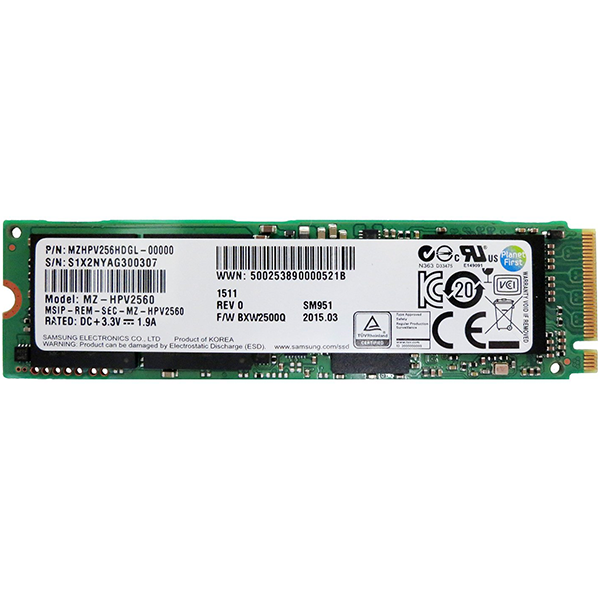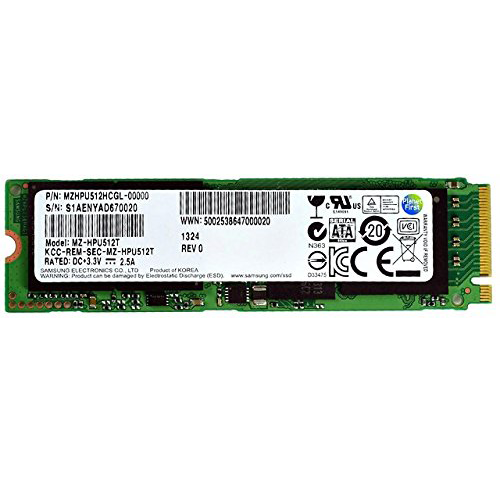Samsung SM951 128GB And 256GB SSD Review
Samsung's SM951 is the hottest storage product on the market. Today we look at the two smaller versions, both of which still perform better than SATA.
Why you can trust Tom's Hardware
Technical Specifications
The three SM951 drives we're testing use AHCI, and are not the rare NVMe interface. In the coming weeks, NVMe-based models will begin surfacing with channel availability soon after. Several online shops already list pre-order status for the NVMe versions, though we've yet to hear of anyone with product on-hand.
The 512GB SM951 we have is Lenovo-specific, with the part number MZHPV512HDGL-000L1. That L1 at the end is a reference to Lenovo. The last five digits indicate the region the drive is sold in. Common codes there are 00001 to 00004, with HP and Lenovo assigned special modifiers. We can also assume that Dell has its own code, since the company plans to release Ultrabook models with SM951 SSDs.
We already know that Lenovo's SM951 has limited sequential read performance. In our testing, we achieved roughly 1700 MB/s, while the 256GB SM951 we received from RamCity is capable of the full 2150 MB/s. The RamCity 128GB sample achieved 2050 MB/s. Because of this, we've noted the Lenovo model in our charts as a Lenovo SM951 512GB. Soon, we'll have a fresh 512GB drive to test for an upcoming editorial that covers the best PCIe and SATA 6Gb/s SSDs, as well as the fastest hard drives on the market today.
The 512GB and 256GB SM951 models share nearly identical performance specifications. The 256GB model loses some write performance. And the 128GB version drops to "just" 600 MB/s sequential reads. At least it retains the same 70,000 random read IOPS rating as the other models.
Get Tom's Hardware's best news and in-depth reviews, straight to your inbox.

Chris Ramseyer was a senior contributing editor for Tom's Hardware. He tested and reviewed consumer storage.
-
Soul_keeper Nice review.Reply
It'd be a shame to see this eventually end up as a 2 horse race intel vs. samsung.
Here's to hoping marvell and others step up this year. -
JQB45 Now we need articles telling us the difference in performance from one motherboard to the next, if any for their built in M2 slots. For example how does an ASUS motherboard compare to say ASRock, etc.Reply -
hrafn42 I would think that the biggest "difference in performance" would be between how many, and what generation, PCIe lanes the MB assigns to the M2 slot -- affecting the bandwidth available to the drive. Most "9-Series" MB only toss a couple of 2nd-Gen lanes, resulting in performance not much better than SATA. A few 9-Series MBs peel off some 3rd-Gen lanes from the graphics slot, and most X99 have 3rd Gen lanes to burn so assign a full four of them to the M2.Reply -
LuxZg # Sorry for previous comment, I pressed something * :P * and no edit / delete buddon in view :-/ #Reply
I'm really hoping for that editorial mentioned in this review. It's unbelivable that last mechanical HDD reviewed by Tom's Hardware was 4TB Seagate in July 2013 !! We've since gone to 8TB drives, new technologies, and so on. I know SSDs are future, but there are still millions of old fashioned HDDs sold each year. I still can't afford a 10TB storage build solely from SSDs.
So please, do a proper editorial, include everything from Intel 750 and new SM951 NVMe editions, performance SATA SSDs, lower end SATA SSDs, speedy SATA HDDs, large archival "green" HDDs, etc. Keep in mind that people have diverse needs. I want a relatively large SSD in my desktop, but one I can actually afford (not costing more than either CPU or GPU), I want a speedy yet small SSD for my laptop, and can afford more $/GB here because I don't need a 1TB drive, but I want it to have good performance per watt, and I also want large storage drive(s) for desktop, but we're always looking for good performance per $$$ spent. These are widely different categories, and some haven't been covered by Tom's in years.
Also, when doing the editorial, please keep the charts of "real-world performance" in seconds. It really is a better way to see where to draw the line. If a test lasts 5 minutes and a 1000$ drive shaves 5 seconds over 100$ drive, I don't want to spend extreme $$$$ for those 5 seconds. OK, someone will want to shave even those 5 seconds, but give us info so we can make our buying decisions.
I personaly am planning on building new PC, AND buying a new laptop, and I really want to make an optimal build(s) where I can decide how many GB/TB I'll appoint in SSDs, and how much in storage HDDs. SSD is getting cheaper all the time, but it's still not THAT cheap if your needs are measured in range of 10TB that you can just go buy some blindly.
As for last few SSD reviews, they really paint an interesting picture, and even more so makes me ask some questions like above. If you overlap some charts, and you're not a heavy workstation user, it does seem that any SSD drive will do for 99% of tasks.. and saving some serious money and investing it in other subsystems is probably a wise choice, instead of just going after benchmark numbers. I'm way past the "my benchmark is bigger than yours", and if it isn't translated in performance that you can percieve with our limited human senses - it's simply a number on paper, no more. -
Luay Two questions come to mind,Reply
Do Z97 motherboards with M.2 slots use Sata or PCI-E?
and, Do video cards installed on a motherboard with an occupied PCI-E M.2 slot operate at x8 bandwidth or at the full x16? -
danlw @LuxZg - I don't see much point in doing performance reviews for mechanical hard drives, other than to show just how much faster SSDs are in comparison. I'm at the point where if I get a mechanical hard drive, it's for archival reasons, and therefore a 5400RPM hard drive is sufficient. It's slower than 7200RPM drives, but I value noise (or rather, lack thereof) over speed when it comes to mechanical storage that I use for archiving. Therefore, the only benchmark metric I care about when it comes to mechanical storage is how quiet (or not) the drive is.Reply
Ultimately, I'd like to move completely away from mechanical storage. But it will be a few years until a 4TB SSD is affordable. Sure, mechanical storage may retain a $/GB edge, but there comes a point when solid state storage is plentiful and large enough that mechanical hard drives will join tape drives as an archive only format that will fade off into computing history as SSDs become large enough to meet most people's needs as both a system and archival drive. -
WyomingKnott I remember other "interim technologies." Personally, I wouldn't consider getting an m.2 drive until I could have nvme and 4 lanes - they are coming so soon, and the advantage will be so great.Reply
By the way, I've built my own systems for some time and this is the first time I have ever considered waiting for the next great thing to come out. It's so much more difference than the usual increment. -
John Philips I think it´s no good using it with a Z97 platform, since there are only 16 pcie lanes available, so these ssds may split to 8x for both, which is the case of the Impact vii. Go for X99.Reply -
Blueberries ReplyI think it´s no good using it with a Z97 platform, since there are only 16 pcie lanes available, so these ssds may split to 8x for both, which is the case of the Impact vii. Go for X99.
The SM951 uses 4 lanes, the XP941 uses 2.
-
hrafn42 ReplyThe SM951 uses 4 lanes, the XP941 uses 2.
Actually, the XP941 uses 4 Gen2 lanes, the SM951 4 Gen3 lanes.

